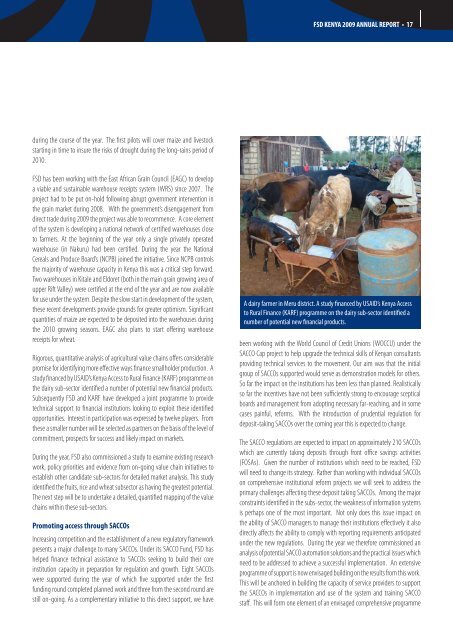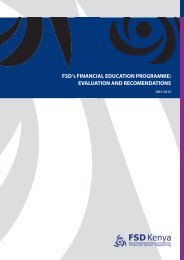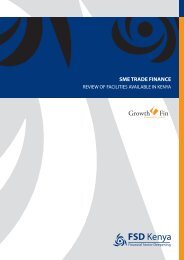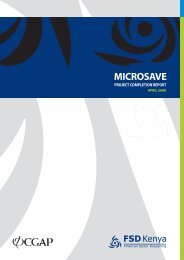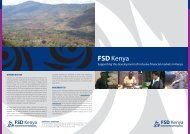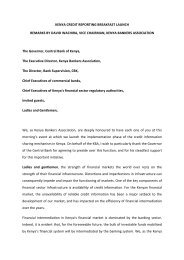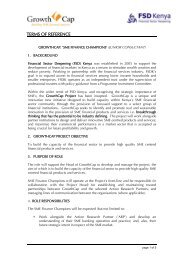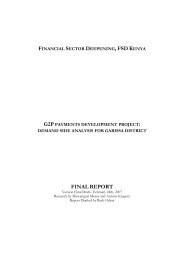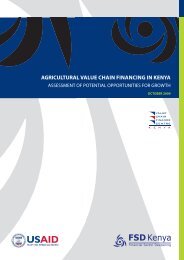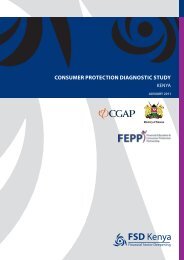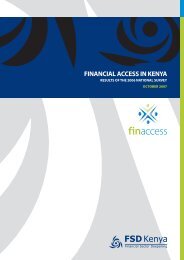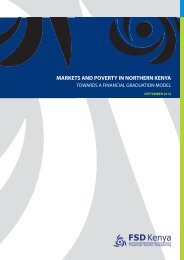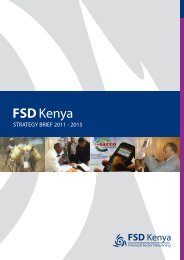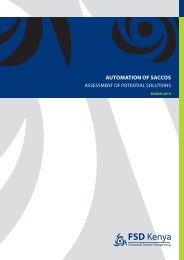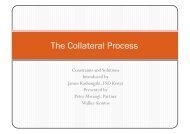2009 - FSD Kenya
2009 - FSD Kenya
2009 - FSD Kenya
Create successful ePaper yourself
Turn your PDF publications into a flip-book with our unique Google optimized e-Paper software.
during the course of the year. The first pilots will cover maize and livestock<br />
starting in time to insure the risks of drought during the long-rains period of<br />
2010.<br />
<strong>FSD</strong> has been working with the East African Grain Council (EAGC) to develop<br />
a viable and sustainable warehouse receipts system (WRS) since 2007. The<br />
project had to be put on-hold following abrupt government intervention in<br />
the grain market during 2008. With the government’s disengagement from<br />
direct trade during <strong>2009</strong> the project was able to recommence. A core element<br />
of the system is developing a national network of certified warehouses close<br />
to farmers. At the beginning of the year only a single privately operated<br />
warehouse (in Nakuru) had been certified. During the year the National<br />
Cereals and Produce Board’s (NCPB) joined the initiative. Since NCPB controls<br />
the majority of warehouse capacity in <strong>Kenya</strong> this was a critical step forward.<br />
Two warehouses in Kitale and Eldoret (both in the main grain growing area of<br />
upper Rift Valley) were certified at the end of the year and are now available<br />
for use under the system. Despite the slow start in development of the system,<br />
these recent developments provide grounds for greater optimism. Significant<br />
quantities of maize are expected to be deposited into the warehouses during<br />
the 2010 growing seasons. EAGC also plans to start offering warehouse<br />
receipts for wheat.<br />
Rigorous, quantitative analysis of agricultural value chains offers considerable<br />
promise for identifying more effective ways finance smallholder production. A<br />
study financed by USAID’s <strong>Kenya</strong> Access to Rural Finance (KARF) programme on<br />
the dairy sub-sector identified a number of potential new financial products.<br />
Subsequently <strong>FSD</strong> and KARF have developed a joint programme to provide<br />
technical support to financial institutions looking to exploit these identified<br />
opportunities. Interest in participation was expressed by twelve players. From<br />
these a smaller number will be selected as partners on the basis of the level of<br />
commitment, prospects for success and likely impact on markets.<br />
During the year, <strong>FSD</strong> also commissioned a study to examine existing research<br />
work, policy priorities and evidence from on-going value chain initiatives to<br />
establish other candidate sub-sectors for detailed market analysis. This study<br />
identified the fruits, rice and wheat subsector as having the greatest potential.<br />
The next step will be to undertake a detailed, quantified mapping of the value<br />
chains within these sub-sectors.<br />
Promoting access through SACCOs<br />
Increasing competition and the establishment of a new regulatory framework<br />
presents a major challenge to many SACCOs. Under its SACCO Fund, <strong>FSD</strong> has<br />
helped finance technical assistance to SACCOs seeking to build their core<br />
institution capacity in preparation for regulation and growth. Eight SACCOs<br />
were supported during the year of which five supported under the first<br />
funding round completed planned work and three from the second round are<br />
still on-going. As a complementary initiative to this direct support, we have<br />
<strong>FSD</strong> KENYA <strong>2009</strong> ANNUAL REPORT • 17<br />
A dairy farmer in Meru district. A study financed by USAID’s <strong>Kenya</strong> Access<br />
to Rural Finance (KARF) programme on the dairy sub-sector identified a<br />
number of potential new financial products.<br />
been working with the World Council of Credit Unions (WOCCU) under the<br />
SACCO Cap project to help upgrade the technical skills of <strong>Kenya</strong>n consultants<br />
providing technical services to the movement. Our aim was that the initial<br />
group of SACCOs supported would serve as demonstration models for others.<br />
So far the impact on the institutions has been less than planned. Realistically<br />
so far the incentives have not been sufficiently strong to encourage sceptical<br />
boards and management from adopting necessary far-reaching, and in some<br />
cases painful, reforms. With the introduction of prudential regulation for<br />
deposit-taking SACCOs over the coming year this is expected to change.<br />
The SACCO regulations are expected to impact on approximately 210 SACCOs<br />
which are currently taking deposits through front office savings activities<br />
(FOSAs). Given the number of institutions which need to be reached, <strong>FSD</strong><br />
will need to change its strategy. Rather than working with individual SACCOs<br />
on comprehensive institutional reform projects we will seek to address the<br />
primary challenges affecting these deposit taking SACCOs. Among the major<br />
constraints identified in the subs-sector, the weakness of information systems<br />
is perhaps one of the most important. Not only does this issue impact on<br />
the ability of SACCO managers to manage their institutions effectively it also<br />
directly affects the ability to comply with reporting requirements anticipated<br />
under the new regulations. During the year we therefore commissioned an<br />
analysis of potential SACCO automation solutions and the practical issues which<br />
need to be addressed to achieve a successful implementation. An extensive<br />
programme of support is now envisaged building on the results from this work.<br />
This will be anchored in building the capacity of service providers to support<br />
the SACCOs in implementation and use of the system and training SACCO<br />
staff. This will form one element of an envisaged comprehensive programme


